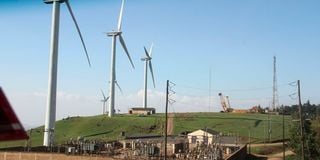Can Africa grasp its potential as a green powerhouse?

Power-generating wind turbines at the Kenya Electricity Generating Company station in Ngong Hills. PHOTO “ FILE
What you need to know:
- Africa's capacity to lead in this transition faces obstacles due to reluctance from developed countries to fulfil their commitments on supporting developing nations' transition efforts.
- Statistics show that Africa has not received the global support from developed countries, an obvious demonstration that more needs to be done.
Simon Stiell, the executive secretary of the United Nations Framework Convention on Climate Change (UNFCCC), spoke to Climate Action and underscored the potential of Africa's ample renewable energy resources, positioning the continent to play a vital role in the global transition.
"80 per cent of Kenya's energy is derived from wind, solar and hydro, depicting what the energy future could look like. Africa's possession of critical minerals essential for the global energy transition calls for it to be at the head table," he stated.
However, Stiell pointed out that Africa's capacity to lead in this transition faces obstacles due to reluctance from developed countries to fulfil their commitments on supporting developing nations' transition efforts.
"Statistics show that Africa has not received the global support from developed countries, an obvious demonstration that more needs to be done," Stiell noted.
His observation echoed the sentiments expressed by African heads of state during the recently ended Africa Climate Summit as they called for more decisive action. In the recently drafted Nairobi Declaration, the leaders advocated for reforms in the global financial system, particularly addressing the issue of African nations facing higher borrowing costs than wealthier countries. These disparities result in recurring debt crises, hampering their ability to invest more in climate change adaptation and mitigation.
President William Ruto, who also chairs the Heads of State Committee on Climate Change, addressed the burden of high debt distress caused by exorbitant interest rates for development capital.
Dr Ruto stressed the importance of Africa voicing its concerns and urged the international community to listen, emphasising that climate change detrimentally impacts Africa's economies. At the same time, it continues to face unfair borrowing standards.
Regarding climate financing, the UNFCCC executive secretary emphasised the urgent need for support and sustainable development to enable Africa to unlock its full potential. Stiell acknowledged the abundant resources in Africa and concurred on the necessity of establishing a new global framework to realise the continent's potential and fulfil its goals.
“As a developing region based on the global economic framework, Africa needs a new financial architecture that speaks to equity, fairness and providing space for others to perform," he added.
Asked whether new agreements were necessary, Stiell noted that frameworks like the Kyoto Protocol and the Paris Agreement already offer ample scope and flexibility. He emphasised that the key to progress lies in changing the approach and response of involved parties, urging nations to explore internal solutions to meet their agreed-upon obligations.
"Climate frameworks and conventions provide the scope and space, clearly stating what needs to be done nationally and globally. They don't need to change. The political will to act is the problem, and every nation must look internally to meet its obligations", he added.
Stiell echoed the sentiment of African leaders, emphasising the need for more action and seeking solutions that would position the continent as both a supplier of raw energy and a beneficiary. These remarks align with the final proposal in the Nairobi Declaration, where the heads of state demanded recognition of Africa's role as a provider of clean energy minerals and renewable energy sources while also highlighting the necessity for support in developing Africa's green industries and value chains.
Highlighting the importance of combining climate action with development, Stiell stated that delivering the pledged $100 billion by 2030 would provide the necessary financing to expedite climate action. He stressed that finance should be viewed within the context of mitigation and adaptation. "Africa's massive potential to play a pivotal role is yet to be realised," Stiell concluded.
The summit's declaration, which predominantly focused on securing funding to address escalating extreme weather events, preserve natural resources and promote renewable energy, advocated for an increase in concessional lending by multilateral development banks to less affluent nations. It also urged using the International Monetary Fund's special drawing rights mechanism more effectively.
Furthermore, the declaration proposed various initiatives to assist heavily indebted countries in averting defaults such as introducing financial instruments granting 10-year grace periods and extending sovereign debt maturity.




